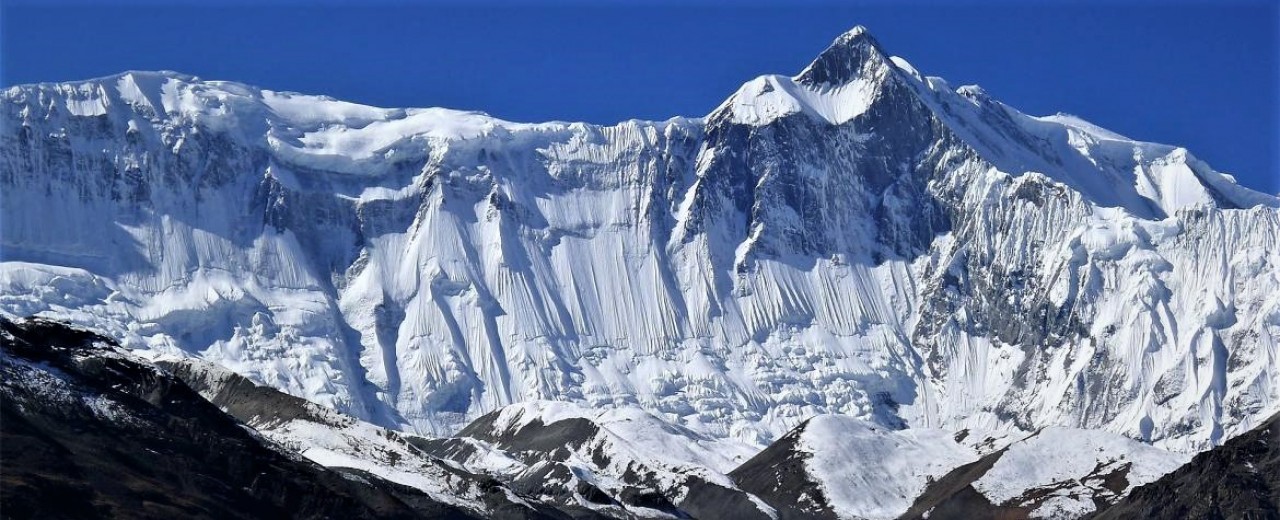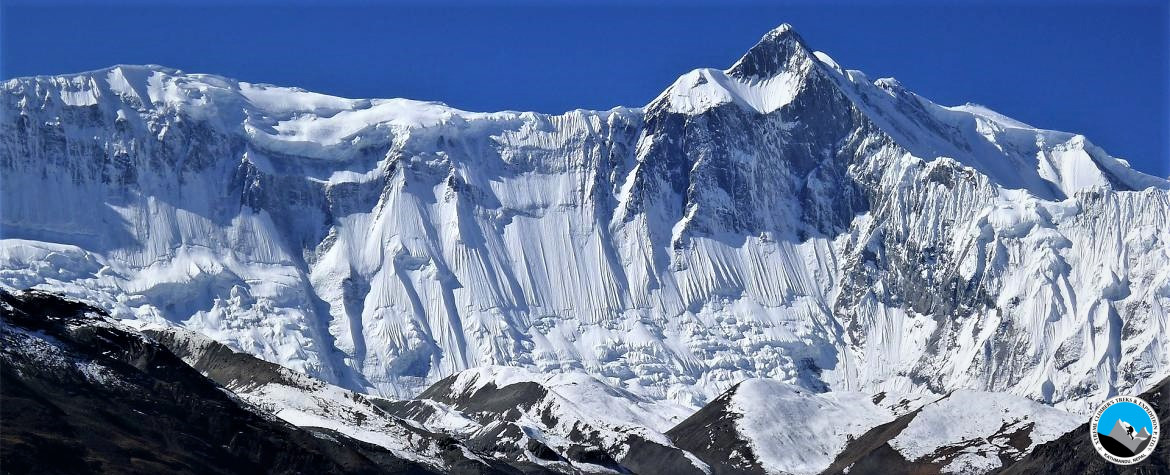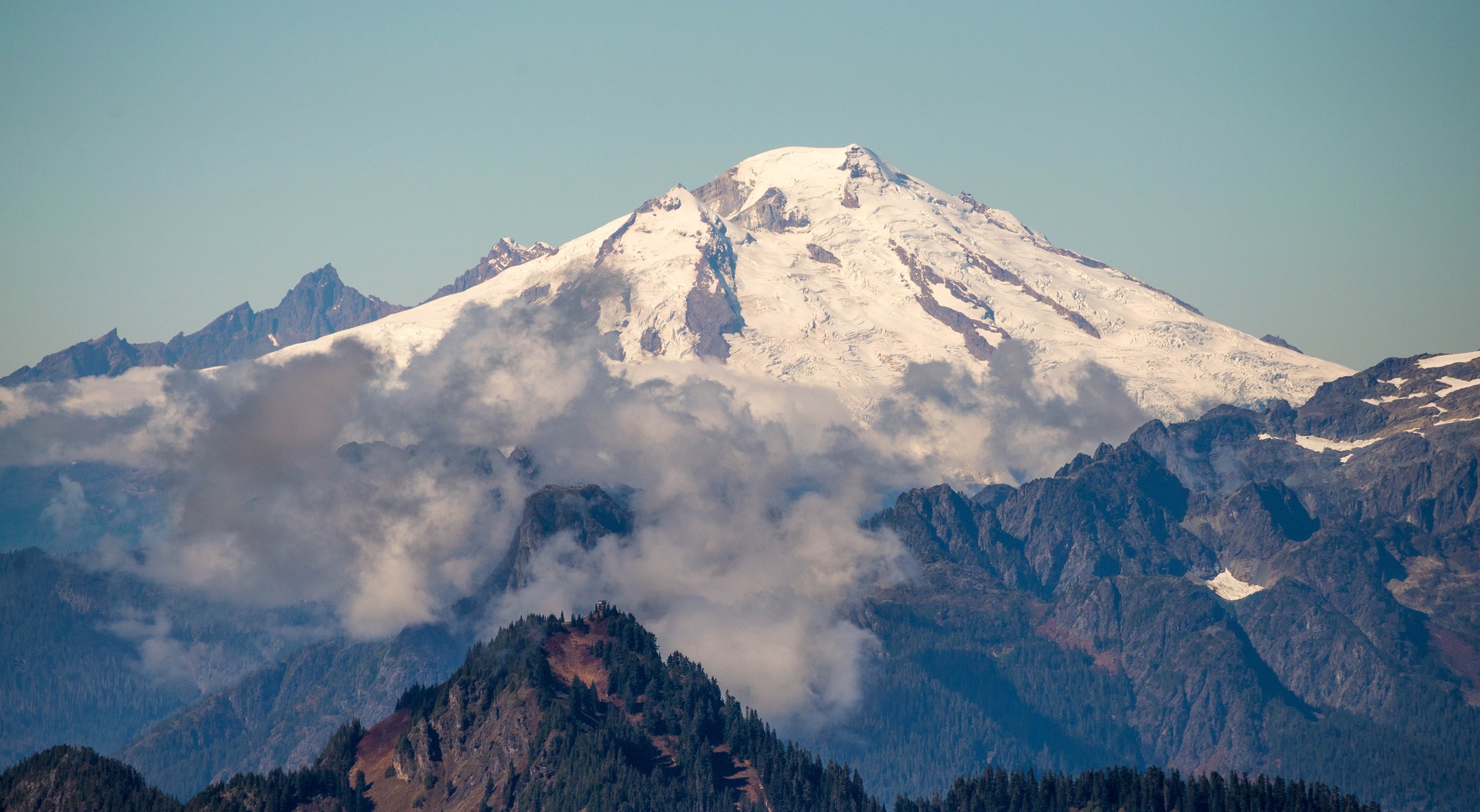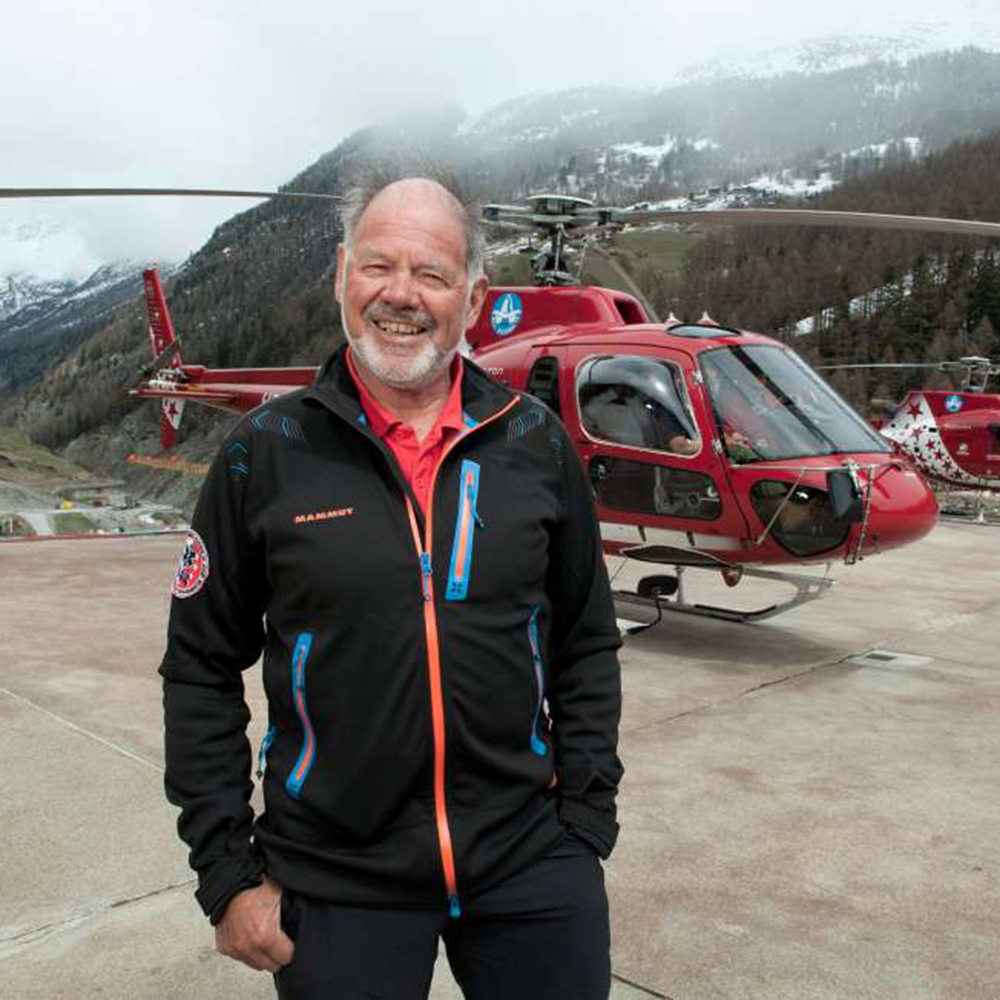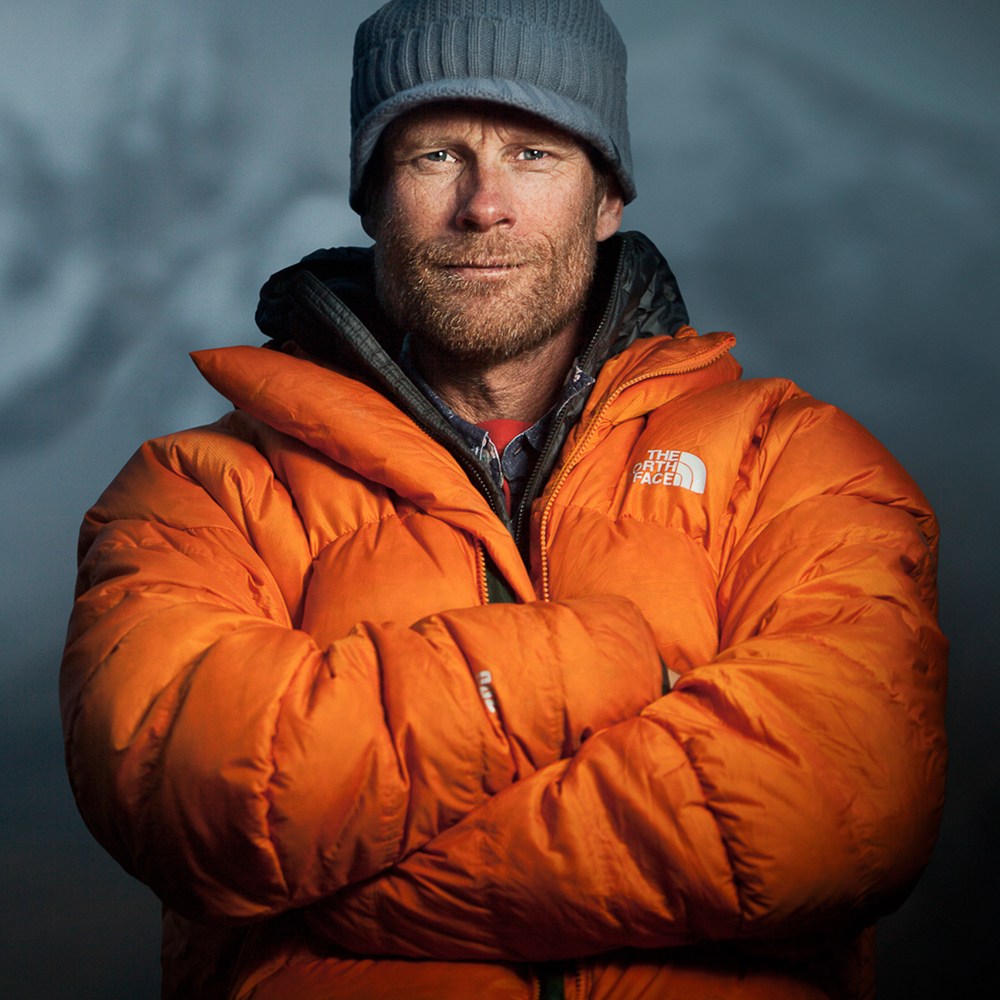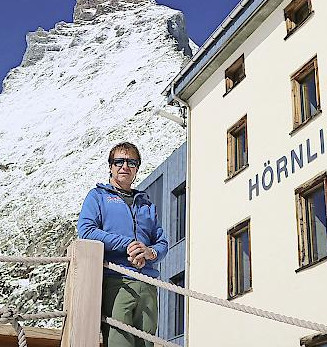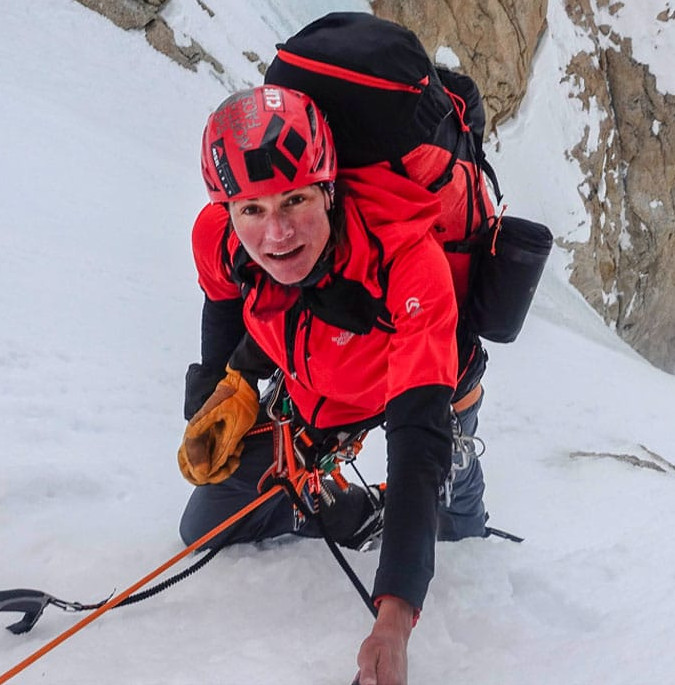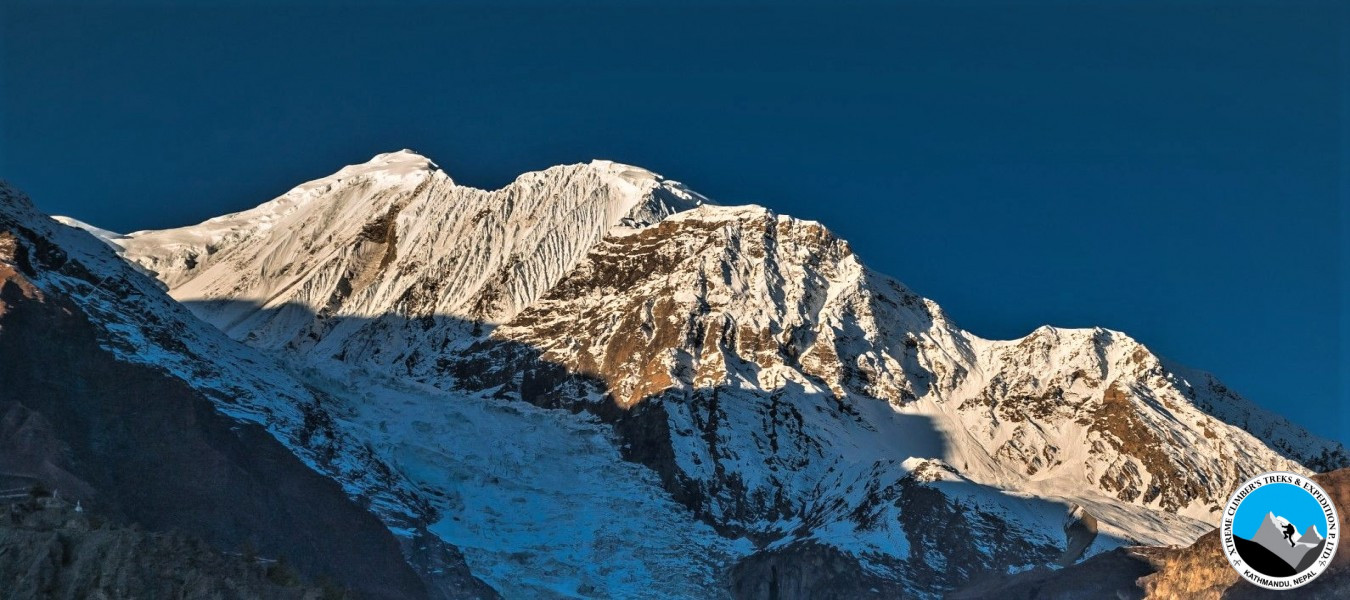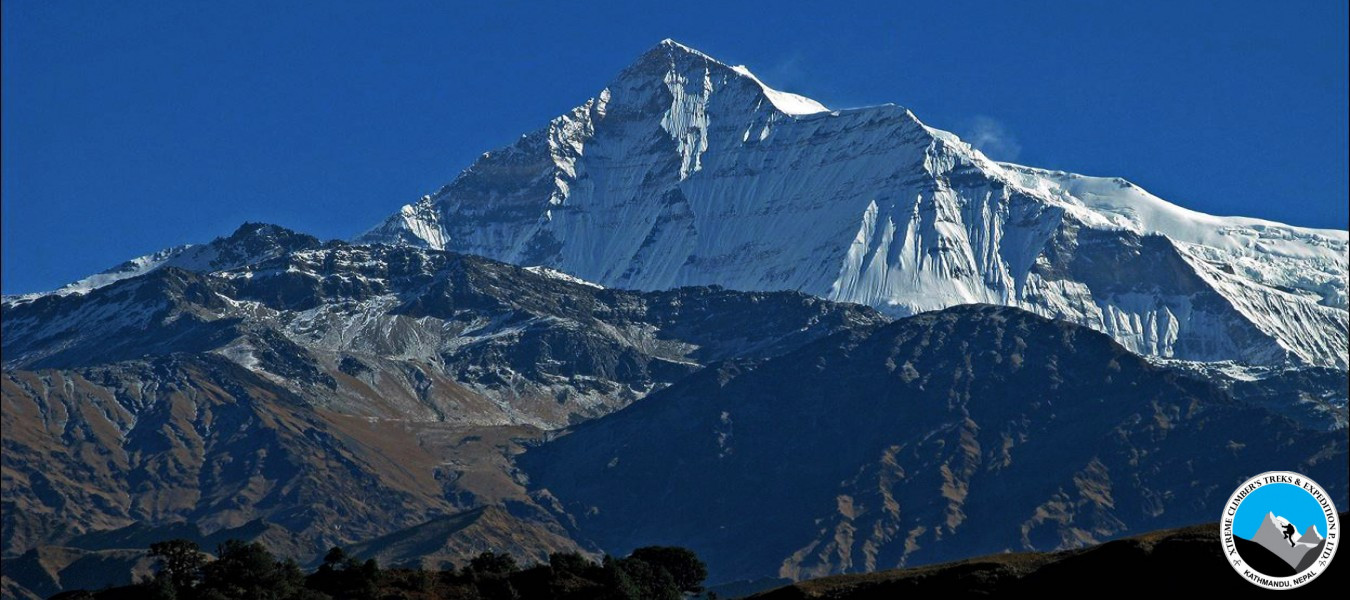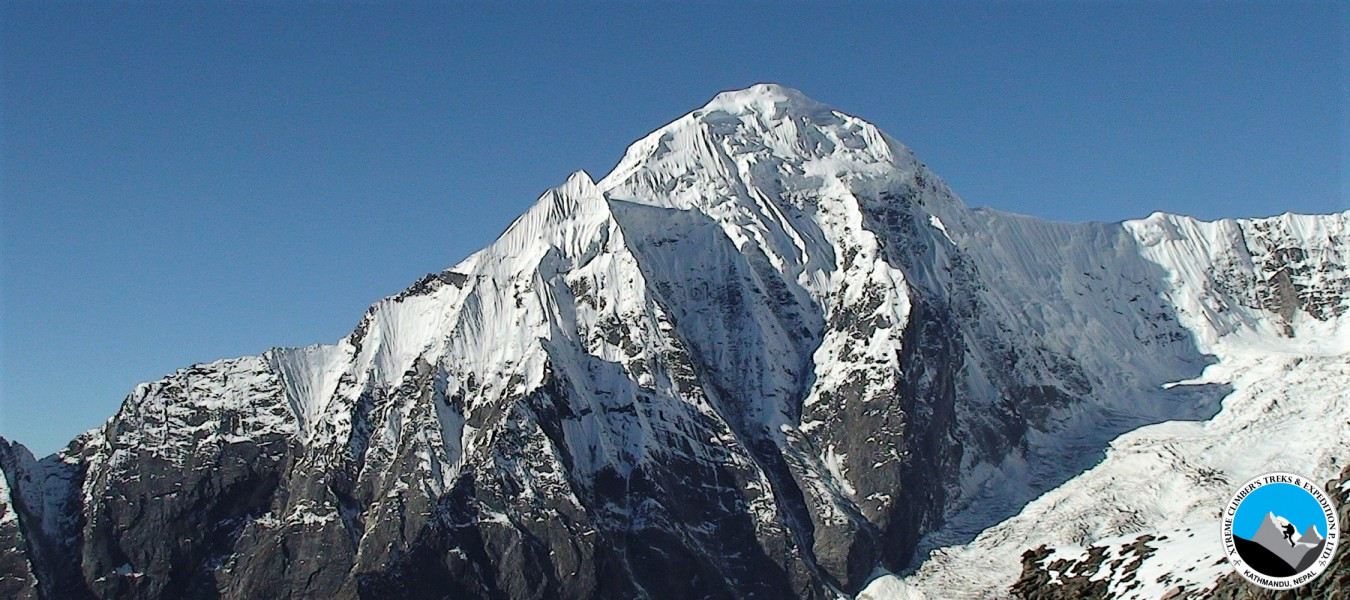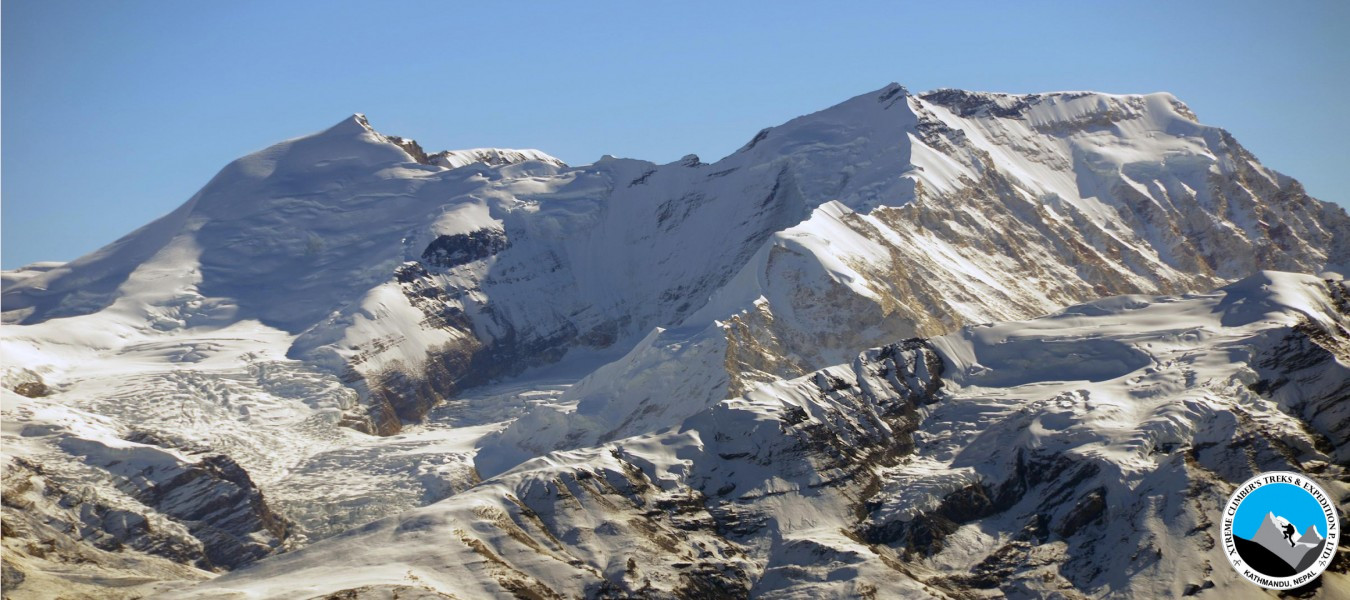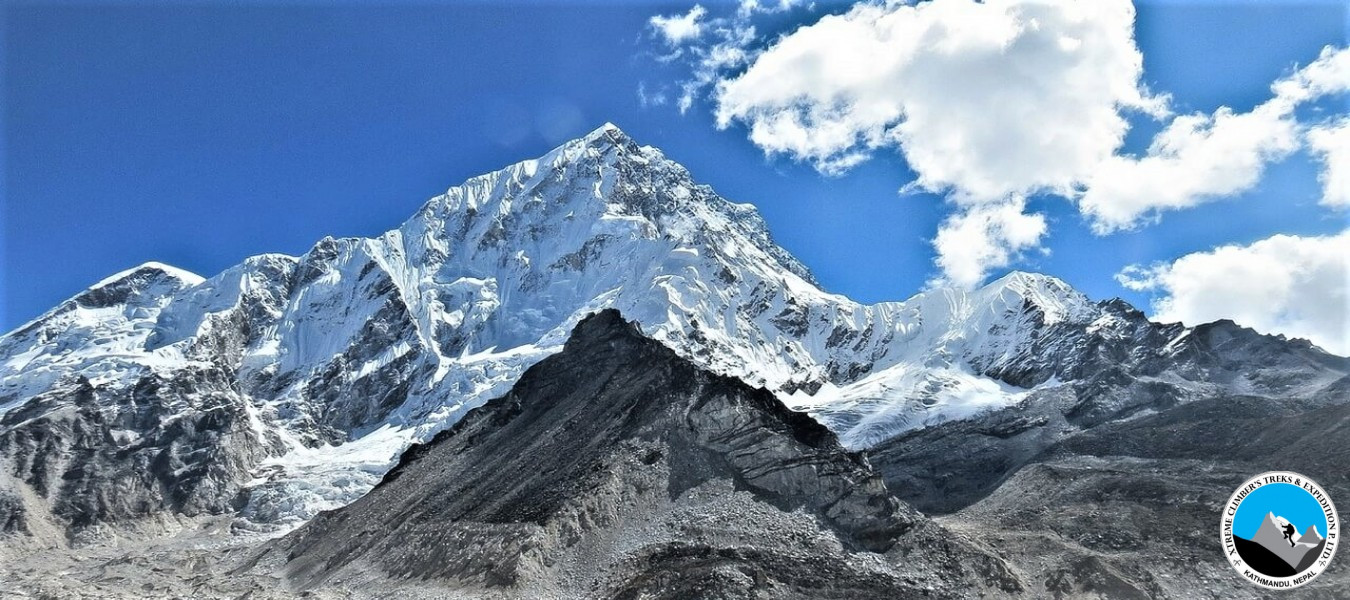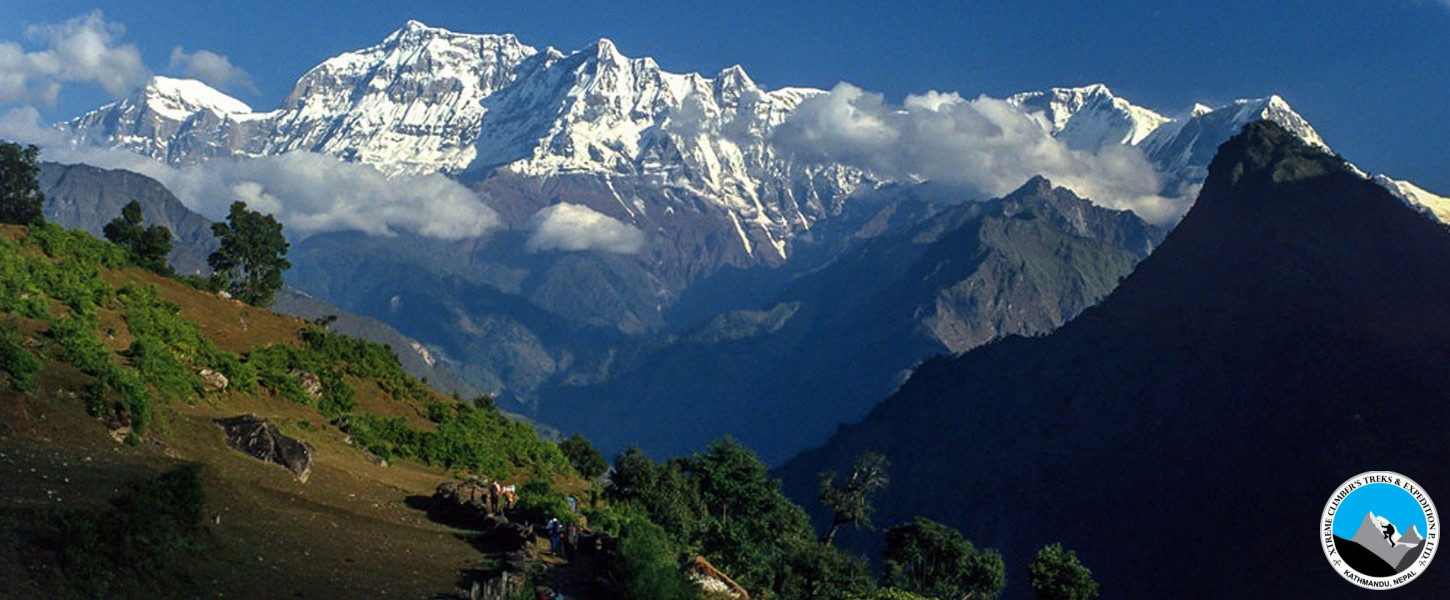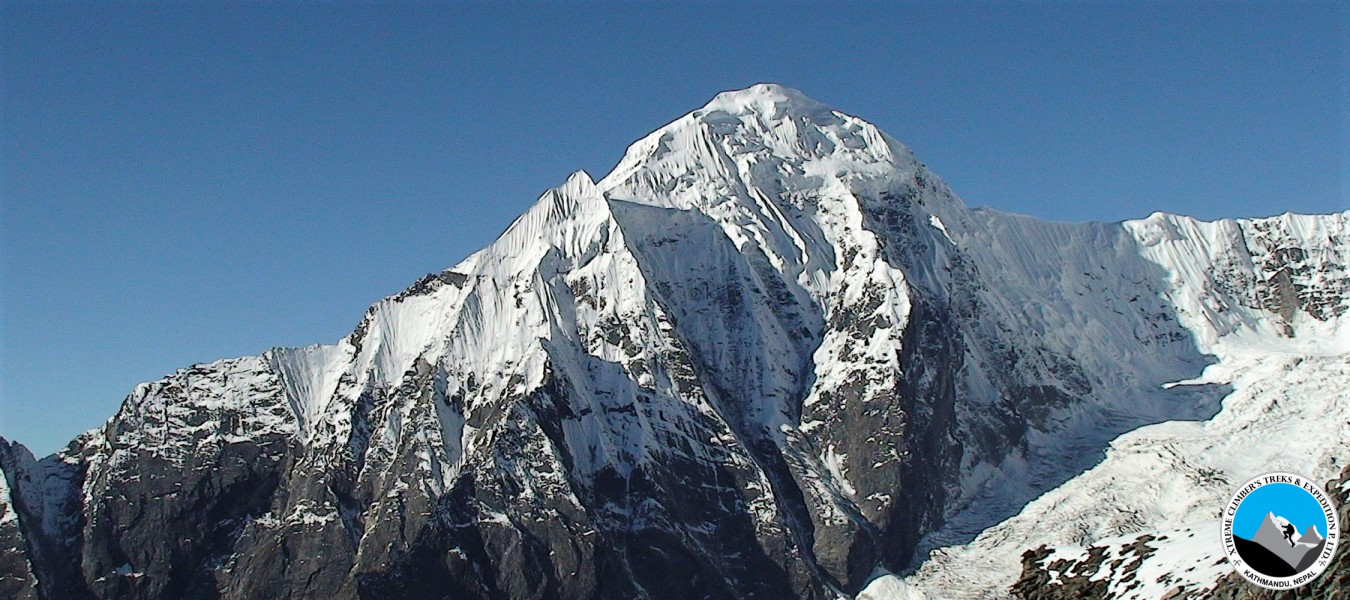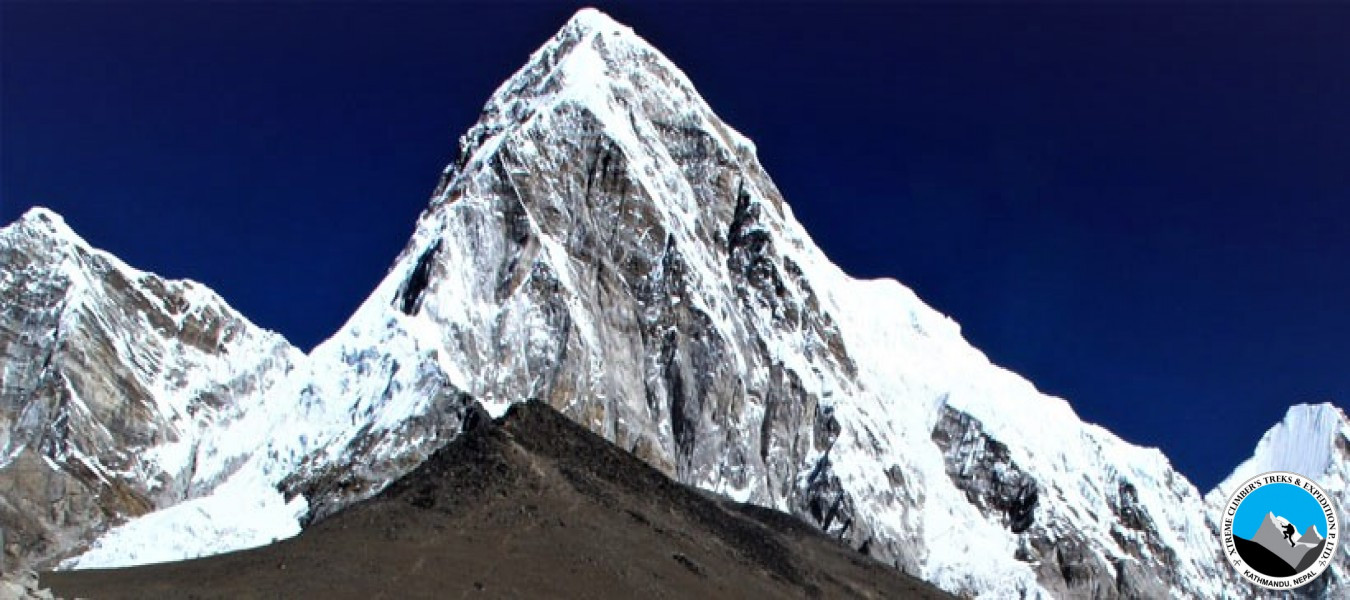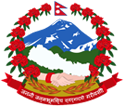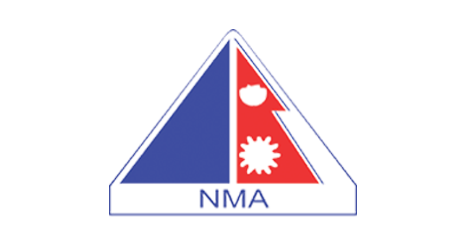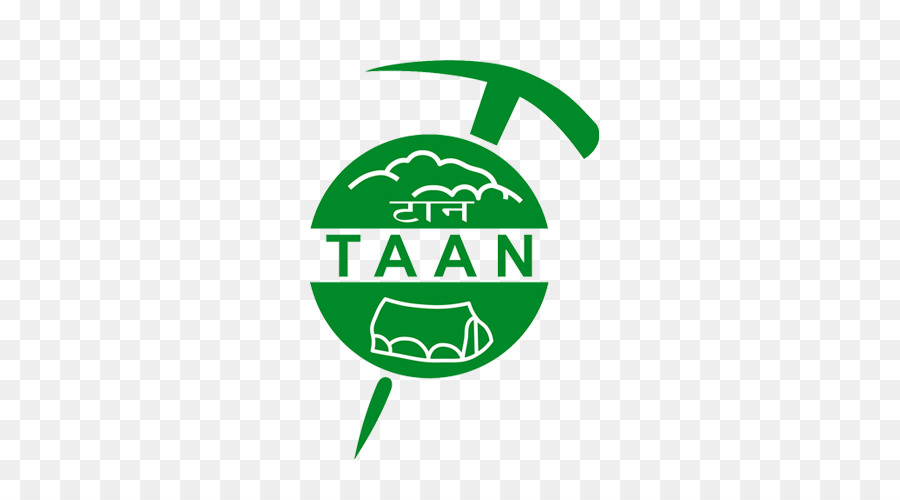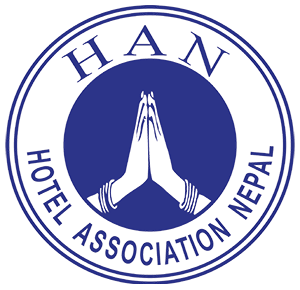Tilicho peak (7134m/23,406ft) is one of the more attractive 7000m expeditions in Annapurna region. Tilicho peak was first climbed in 1978 by Mr. Emanuel Schmutz from a French expedition team. North West shoulder route is the normal climbing route for the Tilicho Peak. Tilicho Peak is the highest point of the Great Barrier which links Khangsar Kang (7458m) and Nilgiri North (7061m) together. The peak was discovered in 1950 by a team led by Maurice Herzog who was attempting to find Annapurna I. The highest glacier lake Tilicho Lake is formed by the melting ice of Tilicho Peak.
Mount Tilicho Peak is the highest point of the Great Barrier which links Khangsar Kang (7,458m.) and Nilgiri North (7,061m.) together, Tilicho Peak is towers at the height of 7,134m. Mountaineers rate this as a technical climb, and not so easy. There are two ways to reach up to Base Camp. Tilicho Peak expedition starts up with a drive Khudi followed by several days trekking to the Tilicho Base Camp via Manang and Khansar Village as well as another way is a short mountain flight from Pokhara brought us to the dry and dusty hill town of Jomsom as well as start from Beni Bazaar to Jomsom. From here we proceed east and north to cross the high and very difficult Mesokanto Pass at an altitude of 5300m. At the top of the pass we managed to locate some marine fossils (shells) which testify to the fact that the Himalayas was once beneath the sea. We choose the first idea as this allows enough time for acclimatization and less difficulties for taking all the logistics. The views on the routes are breathtaking; anything that can surpass your imagination. What you see is Tilicho Peak and the azure and peaceful Tilicho Lake below. It is a glacial lake and unfriendly to marine life. People say they often find marine fossils (shells) that probably support the fact that the Himalayas were once beneath the sea.
Xtreme Climbers set up the base camp near the lake some of days will be rest celebrating the Puja by Buddhist priest. Tilicho stands as a daunting task above the camp which is on a moraine. From the base camp (around 4400m.) we set out for our final goal – Tilicho 7,134m. Tilicho (7,135m.) as seen from near the Base Camp.
Download Pdf
-
Spring, Autumn & Winter
-
Kathmandu (Capital of Nepal)
-
Hotel in Kathmandu on BB plan / Mountain lodge (tea house) in Trekking.
-
Domestic airplane and tourist vehicles
-
Breakfast and welcome or farewell dinner in Kathmandu / Full board in Trekking (Breakfast, Lunch & Dinner).
-
Helicopter : AS 350 B3E (H125)
- Capacity : 1 pilot + 6 Passengers
- Max takeoff weight : 2250 kg
- Power Plant : 1 Turbomeca Arriel 2D
- Service Sling : 23000 Ft
- Rate of Climb : 1818 fpm
- Cruising Speed : 137 knots
- Call Sign: 9N – AKP & 9N AKG
-
Day 1 : Arrive in Kathmandu airport, meet our staff then transfer to Hotel.
Meal includes:Breakfast
-
Day 2 : Day 02: Free day in Kathmandu.
Meal includes:Breakfast
-
Day 3 : Preparation for Expedition & briefing at Ministry of Tourism.
Meal includes:Breakfast Dinner
-
Day 4 : Drive to Besisahar and continue drive to Chamje 1325m. O/N at Teahouse Lodge
Meal includes:Breakfast/Lunch/Dinner
-
Day 5 : Chamje - Bagarchap 2164m. O/N at Teahouse Lodge
Meal includes:Breakfast/Lunch/Dinner
-
Day 6 : Bagarchap – Chame 2713m. O/N at Teahouse Lodge
Meal includes:Breakfast/Lunch/Dinner
-
Day 7 : Chame - Pisang 3185m. O/N at Teahouse Lodge
Meal includes:Breakfast/Lunch/Dinner
-
Day 8 : Pisang - Manang village 3351m. O/N at Teahouse Lodge
Meal includes:Breakfast/Lunch/Dinner
-
Day 9 : Rest day at Manang Village for acclimatization.O/N at Teahouse Lodge
Meal includes:Breakfast/Lunch/Dinner
-
Day 10 : Manang - Khangsar (3700m. -3 hrs). O/N at Teahouse Lodge
Meal includes:Breakfast/Lunch/Dinner
-
Day 11 : Khangsar - Tilicho Base Camp (4400m. 6-7 hrs) O/N at Teahouse Lodge
Meal includes:Breakfast/Lunch/Dinner
-
Day 12 - 28 : Tilicho Peak (7,135m.) Climbing Period (Tented Camp)
-
Day : 29 Clean up BC then trek to and backpack.
Meal includes:Breakfast/Lunch/Dinner
-
Day : 30 Tilicho Peak BC – Mesokanto Pass (5315m.) – Nama Phu Kharka.
Meal includes:Breakfast/Lunch/Dinner
-
Day : 31 Nama Phu Kharka – Jomsom.
Meal includes:Breakfast/Lunch/Dinner
-
Day : 32 Jomsom-Pokhara by flight then transfer to Hotel.
Meal includes:Breakfast
-
Day : 33 Pokhara – Kathmandu by tourist Bus then transfers to Hotel.
Meal includes:Breakfast/Dinner
-
Day : 34 Final Departure
Note: The above itinerary can be tailor made as per client's request, we can make the itinerary shorter/Longer by cutting or adding days, People who have longer time can add the White Water Rafting, Jungle safari tour in Chitwan National park, Paragliding and Zeep Flyer in Pokhara and other extra activities so feel free to write us on info@xtremeclimbers.com for further details.How to book a trip ?
Full Board Service Includes
- All arrival and departure transfer services to and from Airport both Domestic and International with other necessary surface transport (by Non A/C Vehicles) as per itinerary.
- Assistance at the International airport by Xtreme Climbers representative while arriving and departing
- 4 Nights accommodations at ****Hotels in Kathmandu on B/B basis.
- Required necessary camping/Trekking taffs including experienced guides (Government Licence) and porters during the trekking and climbing.
- Required necessary high quality trekking and camping equipments like camp furniture, kitchenware, dining and Toilet tents, guest tents, etc…
- VE-25 North Face Tents for members
- Highly professional Climbing Sherpa Guide (Everest Summiter)
- 3 meals a day (Breakfasts, Lunch and Dinners with tea or coffee) along with available accommodation at Hotel/ Lodge/ Guest Houses or tents for members and staffs during trek and climbing in twin sharing basis.
- Per person 35 kg baggage allowance during trekking-up carrying by porter or Yak and 25kg baggage allowance while returning from Base Camp after climbing the Mt. Tilicho
- Trekking Permit (National Park entry fee)and TIMS card (Trekking Information Management System).
- Expedition Royalty and permit of Nepal Government to climb Mt. Tilicho
- One Experienced, Trained, Government Licensed, and Everest Summiteer Climbing/expedition Guide (Sherpa) per client.
- All wages, equipments, medical and accidental Insurances for all involved staffs in trekking and expedition.
- First Aid medical kits for the Group and the staffs.
- Thuraya SAT Phone (Emergency use only) carrying by Guide for communication and available for members with the cost of US$ 4 per minute call.
- Nepalese Government Royalty.
- Radio Walki Talki
- Appropriate food for high altitude and all climbing crew at base camp and above as required.
- Required fixed and dynamic rope during climbing period.
- Emergency Oxygen mask and regulator provided on requirement of guest with appropriate charge.
- Solar panel for light and battery charger.
- We provide Sherpa's tents, food for climbing, and insurance
- Free assistance service for Cargo clearance and Duties.
- Our service charge and Government Taxes levied in Nepal.
- Complete pre-departure information, flight ticket reconfirmation and visa extension procedure services (if necessary)
- Farewell Dinner in a typical Nepali restaurant with domestic culture show in Kathmandu before departure.
Base Camp Service Includes
- All arrival and departure transfer services to and from Airport both Domestic and International with other necessary surface transport as per itinerary.
- Assistance at the International airport by Xtreme Climbers representative while arriving and departing.
- 4 nights ****star Hotel accommodations in Kathmandu on B/B basis.
- All trekking and camping equipments like camp furniture, kitchenware, dining and Toilet tents, guest tents, etc.
- 3 meals a day (Breakfasts, Lunch and Dinners with tea or coffee) along with available accommodation at Hotel/Lodge/Guest Houses or tents for members and staffs during trek and climbing in twin sharing basis.
- Trekking Permit (National Park entry fee)and TIMS card (Trekking Information Management System).
- Expedition Royalty and permit of Nepal Government to climb Mt. Tilicho
- Nepalese Government Royalty
- Per person 30 kg baggage allowance during trekking-up carrying by porter or Yak and 20kg baggage allowance while returning from Base Camp after climbing the Mountain.
- All wages, equipments, medical and accidental Insurances for all involved staffs.
- First Aid medical kits for the Group and the staffs.
- Thuraya SAT Phone (Emergency use only) Carrying by Guide for communication and available for members with the cost of US.$ 4 per minute call.
- Appropriate food for high altitude and kitchen crew up to base camp.
- All necessary paper works, office Service charge and Government Taxes levied in Nepal.
- Free assistance service for Cargo clearance and Duties.
- Our service charge and Government Taxes levied in Nepal.
- Complete pre-departure information, flight ticket reconfirmation and visa extension procedure services (if necessary)
- Farewell Dinner in a typical Nepali restaurant with domestic culture show in Kathmandu before departure.
Cost and payment details
The cost is depending on group size, affected due to the requirement of number of guides and porters, requisite of Hotel in Kathmandu, method of land/air transport. The itinerary is changeable and modifiable as per needs and time frame of trekkers. Cost will be re calculated if the itinerary is changed or modified. Additional activities may be added as per trekkers request with appropriate additional cost. For Total Tour cost EMAIL US, we will send you within 24 hours as your requirements.
Why we dont't include cost in our website?
NOTE: To provide you service in reasonable cost and attempt to address your each requirement Xtreme Climbers desired to provide you with some information which directly affects the cost and also helps us breakdown the cost. That is why we have decided to clarify our customers that due to the following reasons mentioned below we have not included the cost of each package in the company website.
-
Climbing season: The climbing permit royalty cost for mountain will be different during Spring and Autumn season. Normally most of the climbers climbs Himalayas in the Spring season. Climbing permit during Autumn will be 50% less than the spring season.
-
The cost of the trip depends on Number of persons joining in group for High expedition or Mountain Climbing including number of climbers, non-climber, base camp supporters, medical doctors, The number of climbing Sherpa guides, high altitude porters, kitchen crew, mode of transport you prefer and many other factors can affect the cost of the trip. Alpine climbing guide as well as the category of the hotel accommodation and the facilities that you aspire in the mountains affect the cost.
-
We operate the High Expeditions, Peak Climbing in full arrangement package and basic arrangement service (full board or base camp service) which directly affects the expedition cost.
-
Request numbers of oxygen, mask regulators and the brands the clients require
-
The itinerary may be changed after reaching an understanding between the agency and the client. Other activities could be added or reduced as per the client's request before processing the trip. Price for reduced activities could be deducted and additional activities could be added in mutual understanding.
-
Either you want to operate this expedition as international group joining basics of Xtreme Climbers or individual (private arrangement) expedition.
-
Type of high camp food that clients require. Any specialized food that has to be ordered from foreign countries will be costlier compared to the one available here.
-
Either any of the climbers intend to attempt any world records? If so, do they require special services or equipment?
Due to the reasons mentioned above we would like to discuss with our client directly before offering the cost. So please feel free to drop your queries in info@xtremeclimbers.com or login to www.xtremeclimbers.com for any information about your selected package.
Full Board Service Excludes
- Nepal entry visa fee US$ 25 (duration 15 days ) and US$ 40 (duration 30 days )
- Lunch and Dinner during your stay in Kathmandu (except for the welcome and farewell dinner)
- Any packed food/snacks, aerated drinks, energy drinks, mineral water, alcohol, cigarettes, chocolates, nutria-bars or any other food consumed beyond the prescribed breakfast, lunch and dinner, etc.
- Items of personal nature, Laundry Expenses, Tips.
- Expenses incurred towards usage of landlines, mobiles, walkie-talkies or satellite phone And Internet expenses
- Clothing, Packing Items or Bags, Personal Medical Kit, Camera/Video Fees or Trekking Gears
- Any extra expenses arising out of various/unforeseen situations like natural calamities, landslides, political disturbances, strikes, changes in Government regulations, etc.
- Transportation is not on disposal basis. It is strictly as per the itinerary. Any extra distance travelled will be charged extra.
- Any additional staff other than specified.
- Rescue, Repatriation, Medicines, Medical Tests and Hospitalization expenses.
- Medical Insurance and emergency rescue evacuation if required.
- Travel Insurance and helicopter rescue.
- Walkie-talkies & Filming permit (if special camera).
- Personal climbing gears;
- Nepal custom duty for import of expedition goods.
- Tips, gifts, souvenirs.
- Any other item not mention on cost included.
- Airfare of international flights.
- Nepal entry visa fee (Visa issuance is easy at the arrival)
- Any extra services or products or offers or activities which are not mentioned in the itinerary
Base Camp Service Excludes
- Nepal entry visa fee US$ 25 (duration 15 days ) and US$ 40 (duration 30 days )
- Any packed food/snacks, aerated drinks, energy drinks, mineral water, alcohol, cigarettes, chocolates, nutria-bars
- Items of personal nature, Laundry Expenses, Tips
- Expenses incurred towards usage of landlines, mobiles, walkie-talkies or satellite phones And Internet expenses
- Clothing, Packing Items or Bags, Personal Medical Kit, Personal Trekking Gears
- Any extra services or products or offers or activities which are not mentioned in the itinerary
- Any extra expenses arising out of various/unforeseen situations like natural calamities, landslides, political disturbances, strikes, changes in Government regulations,
- Any additional staff other than specified.
- Rescue, Repatriation, Medicines, Medical Tests and Hospitalization expenses
- Medical Insurance and emergency rescue evacuation if required.
- Travel Insurance and helicopter rescue.
- Airfare of international flights.
- Climbing sherpa and High altitude food
- Tent above Base Camp
- Nepal entry visa fee (Visa issuance is easy at the arrival)
- Wake talkies & Filming permit.
- Personal climbing gears
- Nepal custom duty for import of expedition goods
- Government Licensed Climbing Guide(s)
- Appropriate food for high altitude.
- Any other item not included in service included.
- Tips, gifts, souvenirs.
Cost and payment details
The cost is depending on group size, affected due to the requirement of number of guides and porters, requisite of Hotel in Kathmandu, method of land/air transport. The itinerary is changeable and modifiable as per needs and time frame of trekkers. Cost will be re calculated if the itinerary is changed or modified. Additional activities may be added as per trekkers request with appropriate additional cost. For Total Tour cost EMAIL US, we will send you within 24 hours as your requirements.
Altitude Sickness
Acute Mountain Sickness (AMS) is common at high altitudes sickness. In general may occur when people ascend too quickly normally in altitudes of over 3000 m. The symptoms of altitude sickness are due to lower air pressure at high altitudes, which results in lower oxygen levels as you breathe the air in. The air is under less pressure and this makes it harder for your body to get the oxygen out of the air and into the circulation. It's this extra strain on the body that causes altitude sickness.
Symptoms tend to be worse at night and include headache, dizziness, and lethargy, loss of appetite, nausea, breathlessness and irritability. Difficulty sleeping is another common symptom.
The major symptoms of altitude sickness
Initial symptoms
- Periods of sleeplessness
- Runny nose.
- Extra tiredness
- Occasional loss of appetite
- Feeling laziness
- Wish to vomiting
- Periodic breathing
Above are normal symptoms which may occur into your body that you should not be worried. Every trekker will experience some or all of these, no matter how slowly they ascend.
Advance symptoms
- Headache and vomiting
- Dizziness
- Racing heartbeat
- Exhaustion
- Nausea
- Diarrhoea
- Loss of apatite
- Weakness
- Hard to breath
- Extra tired
- Dry Raspy cough
- Sleeplessness
When above symptoms will occur into your body, these symptoms usually resolve by spending one or two extra nights at the same altitude or using medicine. Even you are resting at the same altitude or using medicine, if symptoms are becoming worse, then it is necessary to descend.
Serious Symptoms
- Worsening headache and vomiting
- Swelling of hands and face
- Reduced urine output
- Walking with a staggering gait
- Confusion
- Increased tiredness
- Breathing irregularity
- Visual hallucinations (seeing things that are not real)
- Changes in the ability to think
- Changes in normal behavior
If above serious symptoms will occur into your body, these extremely dangerous symptoms are called High Altitude Cerebral Edema (or HACE). They can lead to unconsciousness and death within 12 hours. Increasing shortness of breath, cough and tiredness may also be signs of High Altitude Pulmonary Edema or HAPE. HAPE can also be rapidly fatal if ignored.
To prevent acute mountain sickness:
- If possible, don't fly or drive to high altitude. Start below 3,000 metres (10,000 feet) and walk up.
- If you do fly or drive, do not overexert yourself or move higher for the first 24 hours.
- If you go above 3,000 metres (10,000 feet), only increase your altitude by 350 to 500 metres (1,000 feet) per day
- Climb high and sleep low! You can climb more than 300 to 500 metres in a day as long as you come back down and sleep at a lower altitude.
- If you begin to show symptoms of moderate altitude sickness, don't go higher until symptoms decrease.
- Drink plenty of water, tea or juice etc (at least three to 4 liters per day). Urine output should be copious and clear to pale yellow.
- Eat high-carbohydrate foods (rice, pasta, cereal) for more energy.
- Take it easy and don't overexert yourself when you first get up to altitude. But, light activity during the day is better than sleeping because respiration decreases during sleep, exacerbating the symptoms.
- Avoid alcohol as it may increase the risk of dehydration, and don't smoke.
- Don't push yourself when climbing up to passes, rather take plenty of breaks.
- Avoid taking sleeping pills.
- Avoid active movements and try to relax in the first one or two days upon arrival at the high altitude areas.
- Bring adequate medicine.
- If nothing else works, return to the areas with the lower elevation.
- Allow sufficient time for acclimatization (After 3000 meters).
- Don’t make rapid Ascent. Don’t go too far too fast.
- Do not trek/travel alone, take guide/porter.
- Follow the advice from your guide, hotel, local, guide book.
- Descent if mild symptoms rapidly getting worse.
- Never leave or descent sick person along.
- Avoid getting cold.
- Take an easy and comfortable trekking route even if its longer
Medicine:
Following is a list of items you should consider including in your medical kit - consult your pharmacist for brands available in your country.
- Aspirin or paracetamol - for pain or fever
- Antihistamine - for allergies, eg hay fever; to ease the itch from insect bites or stings; and to prevent motion sickness.
- Antibiotics consider including these if you're traveling well off the beaten track' see your doctor, as they must be prescribed, and carry the prescription with you.
- Loperamides or Diphenoxylate 'blockers' for diarrhea' Prochlorperazine or metaclopramide for nausea and vomiting.
- Rehydration mixture to prevent dehydration, eg due to severe diarrhea; particularly important when traveling with children.
- Insect repellent, sunscreen, lip balm and eye drops.
- Calamine lotion, sting relief spray or aloe vera-to ease irritation from sunburn and insect bites or stings.
- Antifungal cream or powder - for fungal skin infections and thrush.
- Antiseptic, such as povidone-iodine for cuts and grazes.
- Bandages, band-aids or plasters and other would dressings.
- Scissors, tweezers and a thermometer (note that mercury thermometers are prohibited by airlines)
- Cold and Flu tablets, throat lozenges and nasal decongestant.
- Multivitamines - consider for long trips, when dietary vitamin intake may be inadequate.
Note: We have guides trained at the High Altitude Medical Training Center. Our staff is very experienced in dealing with the effects of higher altitudes. As they are natives of Nepal, they easily acclimatize and therefore can care for their clients. They are equipped with necessary medical supplies and will assist you with basic first aid treatment. We design our tours to ensure clients are ready for high altitude, and arrange alternative itineraries for those at risk
Insurance
Travel insurance is compulsory for all Clients undertaking any tour. It should provide adequate protection for the full duration of the tour to cover personal injury, medical expenses, repatriation expenses, helicopter evacuation, loss of luggage, etc.
For your kind information, we would like to give a list of the insurance companies, please go through the links below:
Footwear
| Trekking Boot |
1 Pair |
| Thick Socks |
4 Pairs |
| Light Socks |
3 Pairs |
| Camp Shoes |
1 Pair |
| Sandals |
1 Pair |
Other Equipments
| Sleeping Bag(4seasons) |
1 |
| Down Jacket |
1 |
| Daypack |
1 |
| Water Bottle |
1 |
| Sun Cream |
|
| Sunglasses |
|
| Flashlight With Spare Bulbs, Batteries, Lip Salve, Gaiters. |
|
Clothing
| Down Or Fiber Filled Waterproof Jacket And Trousers |
1 |
| Fleece Jacket Or Pullover |
1 |
| Warm Cotton Trousers |
2 Pairs |
| Shirts And T-Shirts |
4 Pieces |
| Lightweight Cotton Long Pants |
3 Pairs |
| Long Under Wear |
2 Pieces |
| Short Under Wear |
4 Pieces |
| Sun Hat Or Scarf |
1 |
| Woolen Hat |
1 |
| Sunglasses |
1 |
| Lightweight Gloves |
1 |
| Rain Coat |
1 |
| Heavyweight Gloves Or Mittens With A Waterproof |
1 |
Optional
| Insect Repellent |
| Toilet Articles |
| Note Book & Pen |
| Toilet Roll |
| Laundry Soap |
| Pocket Knife |
| Towel |
| Sewing Kit |
| Plasters |
| Binoculars |
| Camera |
| Film |
| Cards And Personal Medical Kit |
-
Does your company arrange domestic and international flight and other services?
-
Could you give us some information about the guide?
-
How can I enter in Nepal?
-
What about water - are they available at each teahouse? I know we supposed to bring iodine tablets.
-
What if I arrive early or depart late? Can you arrange extra night lodging? Is there a single room option?
See More
